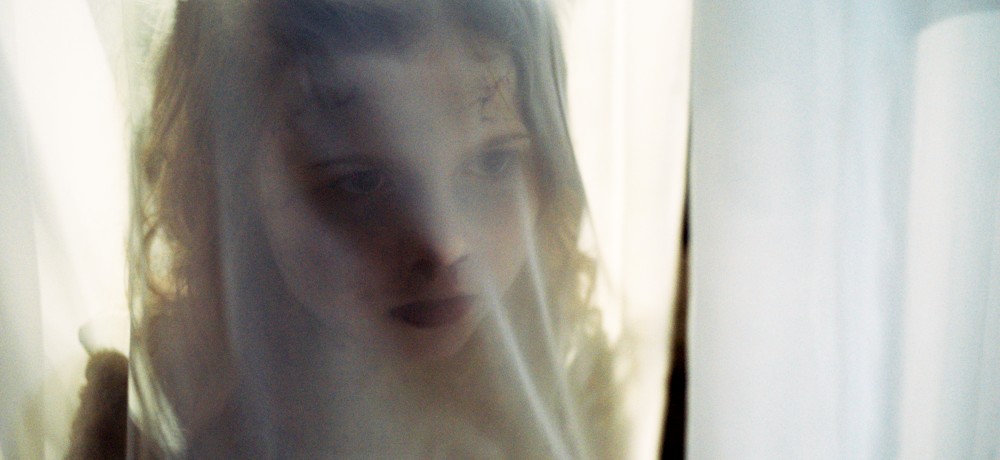






Ghost stories have been a staple of the horror genre since its inception. It’s the fact that these films deal with an enemy unseen that frightens many and has kept these stories around for so long. But how many ways can you tell a ghost story? They can all be similar, but it’s even more frightening when the film involves children. What makes kids, kids – their innocence and trust-worthiness – makes them unaware of the dangers that are out there. Ruth Platt’s Martyrs Lane centers on two children and their friendship, one dead and one living. It's a ghost story mixed with fairy tale elements to emphasize how children see the world differently – until it turns dark. Built upon Platt’s short film of the same name, Martyrs Lane explores love and grief through the lens of a captivating and unsettling haunting, with many secrets to uncover.
A martyr has historically been considered someone who chooses to sacrifice their life or is someone who faces pain and suffering instead of giving up something they hold sacred. In the case of Martyrs Lane, this would refer to Sarah (Denise Gough), a mother in mourning for nearly 10 years and keeping a memory of that loss near her heart in a locket. Someone who’s always suffering in some way is also another definition. This could apply to Sarah, but also the dead who haven’t passed on. In the case of Platt’s film, it’s the phantom child of this story.
The only one who seems to be aware of the mysterious ghost girl is Leah (Kiera Thompson), the youngest to a mostly hateful older sister Bex (Hannah Rae) and the daughter of a strict but loving mother Sarah. She hears disembodied whispers, sees shadows moving in the corner of her eye, and suffers from nightmares that are premonitions or messages from the beyond. The loudest whisper comes from the locket her mother wears, as though a soul is being kept inside like a horcrux in Harry Potter. Inside the locket is a strand of hair and Leah takes it without thinking. As a result of the loss of her locket’s contents, Sarah becomes frantic in her search to find it, and in fear of her mother’s reaction, Leah loses what she stole. Sarah subsequently falls into a depression, becoming distant as though in a period of mourning. This family that seemed at a normal level of dysfunction is at the risk of breaking completely.
All of this occurs at Leah’s home in a close-knit British town where her father is the church’s pastor. Many come to her home asking for her father Thomas's (Steven Cree) aid, and the film emphasizes one passage from the Bible that reads, “Do not neglect to show hospitality to strangers, for by doing so some people have shown hospitality to angels without knowing it.” From reading that, it’s no surprise that Leah asks no questions and has no suspicions when she meets a little girl (Sienna Sayer) dressed in white with costume wings on her back. As the audience comes to realize quickly, Leah’s new friend is dead. She floats up to Leah’s bedroom window every night. At first, asking for help, but they become fast friends, immediately playing “Two Truths and a Lie.” This becomes a nightly ritual, and Leah happily welcomes the mysterious girl with no name who seems to glow angelically. As all souls go to heaven, her father says, Leah begins to wonder why she’s not and becomes suspicious of her intentions. And rightfully so, as their relationship turns dark when they start playing a new game: The ghost girl says that if Leah can figure out her name, she’ll tell her where the missing hair is. Guiding her to what she’s lost ends up being a treasure hunt, Leah digging deeper into the mystery surrounding who this girl is and her connection to her family.
There isn’t very much that happens in Martyrs Lane, but the two young actresses keep the interest going. They both deliver captivating and nuanced performances. Thompson as Leah is quite reserved and contemplative at first, but her interactions with Sayer allow her to come out of her shell more as her character does. She has many moments of emotion and fear, and it’s interesting to explore her place in this family dynamic and how her new friend’s influence affects it. Sayer as the ghost is exceptional. Her presence as the film goes on is framed in a much more frightening way. Sneaking in the background, causing near-death experiences, she’s not as angelic as she seems and Sayer completely embodies that change. She’s no longer angelic as her demeanour changes to reveal something much more demonic. Everyone in the cast is good, but Denise Gough is another standout. From voicing Yennefer in The Witcher 3 video game to playing an exiled member of a cult in The Other Lamb, she always makes the biggest impact in everything she’s in but is still surprisingly underrated. As a woman on a journey to finding peace, she’s the heart of the story.
The ending of the film is quite clumsy in the way it explains who the ghost is and what happened to her, along with firmly establishing the fate of the film’s main characters. It’s one of those, “Is it a dream or not?” kind of endings. But the film is certainly dream-like from beginning to end with its sound work and opening shots that play magically with natural lighting. It made me think of films like FairyTale: A True Story or A Little Princess, and you get swept up in its whimsy – until you look over your shoulder.
Movie Score: 3/5